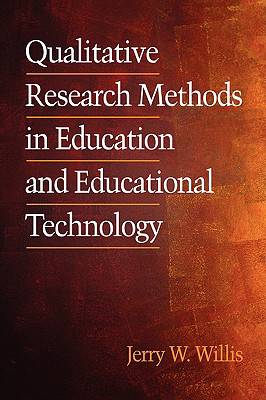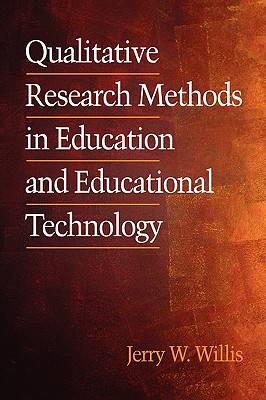
- Afhalen na 1 uur in een winkel met voorraad
- In januari gratis thuislevering in België
- Ruim aanbod met 7 miljoen producten
- Afhalen na 1 uur in een winkel met voorraad
- In januari gratis thuislevering in België
- Ruim aanbod met 7 miljoen producten
Qualitative Research Methods in Education and Educational Technology
Omschrijving
Qualitative Research Methods in Education and Educational Technology was written for students and scholars interested in exploring the many qualitative methods developed over the last 50 years in the social sciences. The book does not stop, however, at the boundaries of the social sciences. Social scientists now consume and use research methods from many fields. The rich resources of research methods and theories from both the humanities and philosophy are also covered in this book. It explains why postpositivist quantitative research should not be "the only game in town" and provides solid theoretical foundations, beginning with the positions of Plato and Aristotle, for broadening our horizons about what warrants our attention. Using Aristotle's concept of phronesis the author shows why methods such as narrative research and storytelling, hermeneutic inquiry, literary theory, philosophical inquiry, and much more have important applications in education and educational technology. On those foundations, the author also builds a framework for doing many types of research - from participatory action research to content analysis, to postmodern case studies, to empowerment research and philosophical inquiry. He accomplishes this through a combination of original text, summaries of exemplary research in education and educational technology, and suggested readings that are annotated and introduced at the end of each chapter. Many of these readings are available online and they extend the discussion of research methods or serve as exemplars of a particular type of educational technology research. There are open ended and conceptual questions for each reading, and developing your own answers to them is one way you can extend your depth of understanding about qualitative research methods in education and educational technology.
Specificaties
Betrokkenen
- Uitgeverij:
Inhoud
- Aantal bladzijden:
- 380
- Taal:
- Engels
- Reeks:
Eigenschappen
- Productcode (EAN):
- 9781930608542
- Verschijningsdatum:
- 28/10/2008
- Uitvoering:
- Paperback
- Formaat:
- Trade paperback (VS)
- Afmetingen:
- 159 mm x 235 mm
- Gewicht:
- 539 g

Alleen bij Standaard Boekhandel
Beoordelingen
We publiceren alleen reviews die voldoen aan de voorwaarden voor reviews. Bekijk onze voorwaarden voor reviews.








